tough business:
a parker site
"Essence of Theater": Alan Grofield & The Glass Closet
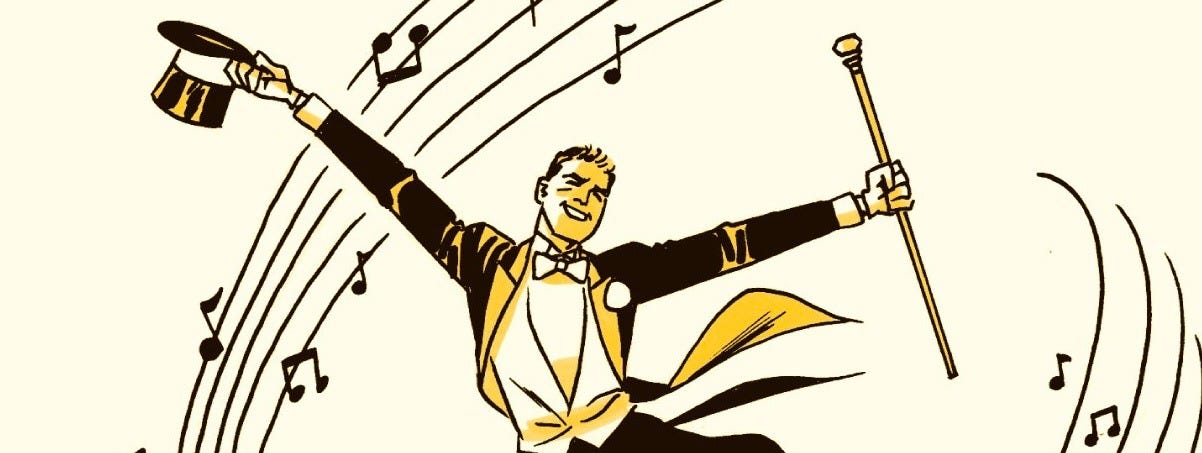
If you know Richard Stark's Parker, you know Alan Grofield. In her foreword to the Da Parker Con Furore (1987) omnibus, Italian crime writer and translator Laura Grimaldi defines the pair as complementary characters. Complementary is just right; although often dismissed as experiments in genre or lighthearted counterparts to the Parker books, the four solo Grofield novels are an essential part of the series, as is the character himself.
In fact, Grofield makes up the other half of the phenomenon Donald Westlake had referred to as "texture and fascination" in his meditations on crime fiction in The Hardboiled Dicks, a 1984 essay reprinted in The Getaway Car: A Donald Westlake Nonfiction Miscellany (2014). In discussing Raymond Chandler's The Long Goodbye and what's kept this kind of story alive and kicking decades after its inception, Westlake states that the genre "becomes both more mysterious and more poignant when given a homosexual coloring."
It is a theme that Westlake's own work dealt with inordinately often – under any name – and although Tucker Coe might be best-remembered on this front with the endlessly sympathetic and explicitly gay-themed A Jade in Aries (1970), Richard Stark was no slouch either. Nearly every entry in the original Parker series features, or at the very least mentions, a gay character. When these men are not merely alluded to, they appear in memorable supporting roles in The Sour Lemon Score (1969) and Plunder Squad (1972). More than that, a case can ultimately be made that Parker himself is gaycoded and his character development is linked to homosocial affection. The series' climax, Butcher's Moon (1974), makes that affection clear and irrefutable. By that point, Parker values only Grofield's safety, and the constant use of 'partner' is telling as well as layered.
But if Parker's arc is played in subtext, if this is the "smothered, unacknowledged homosexuality" Westlake had spoken about in the aforementioned essay, then it is Grofield who's got all his cards on the table. Grofield's sexuality is so blatant that it seems to have circled back around to being subtextual, if a complete lack of acknowledgement from the average reader is anything to go by.
Secondary protagonist to the series, actor, purist, part-time thief by necessity, Alan Grofield is one of Stark's most fascinating – and complex – creations. From his first appearance in The Score (1964), it’s immediately obvious what kind of man Grofield is. There are precursors though, the young man Stubbs meets in The Man with The Getaway Face (1963) for one:
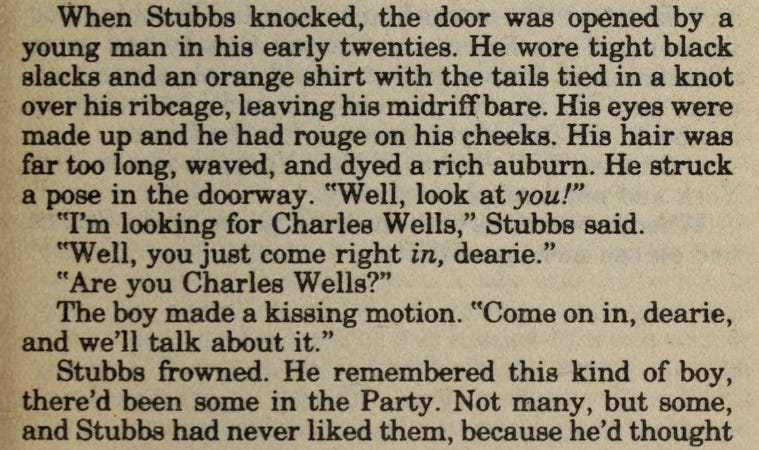
Two books later, Grofield makes his mark:
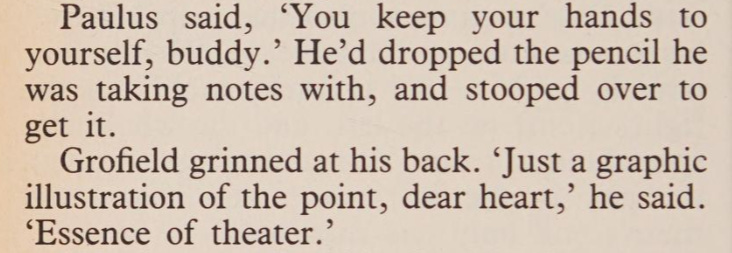
It’s not just the use of ‘dear heart’ that stands out nor the reference to his theatrical expertise but also the fact that Grofield’s contrasted against a backdrop of heterosexual masculinity. In other words, that he’s got the guts to lean towards effeminacy in an all-male environment, among seasoned heisters and professional criminals.
Richard Stark’s output has often engaged in varied analyses of masculinity, most prominently in The Sour Lemon Score during his exploration of Matt Rosenstein’s internalized homophobia and the character’s need to prove his own masculinity to himself but there have been times when Parker’s understood that need in other characters – Beaghler from Plunder Squad comes to mind; “the general trend of it was that he seemed to be trying to describe to Parker, or maybe to himself, his need to be tough, to be more masculine than anybody else. He never said so straight out, but all of the explanations and reminiscences seemed to be on that same theme.” – without feeling it himself. Parker’s sense of self is more neutral than that, he reads as masculine only because his personality consists of traits traditionally associated with masculinity; he’s quiet, determined, driven by logic, technically-minded, etc.
On the other hand, the very first thing we learn about Grofield is that he’s an “intense, lean, handsome man who sometimes acted in summer stock theaters” (The Score). He’s not just an actor, he’s a stage actor – and as we’re reminded over and over again, that’s a vital distinction to Grofield. It is also the basis of his character, the way he’s seen and the way he interacts with the world. A flamboyant actor in the mid-1960s comes across a certain way, and although Grofield isn’t a stereotype, Stark’s writing purposely acknowledges the stereotypical nature of Grofield’s mannerisms and speech patterns and adeptly plays around with it.
For one thing, we’re told Grofield is consistently typecast as a “heavy, either a villain or some sort of sick weakling, and he himself was proudest of his performance as Iago, a lean and sensual and catlike Iago” (The Handle). In The Damsel (1967), we’re again reminded, he’s “usually cast as the evil brother or the weak son or the charming knave.” Not only has Iago’s relationship with Othello been the subject of much scholarly debate, but all of Grofield’s roles explicitly inhabit the realm of Rope (1948), Tea and Sympathy (1953), Psycho (1960), the countless films and plays of the era portraying LGBT-coded characters as ‘sick weaklings’. Stark’s emphasis on the kinds of roles Grofield gets before he runs his own theater speaks to the general perception of the character in-universe.
That perception is confirmed by the way men generally react to Grofield. They’re either annoyed or charmed, the average heterosexual man in Stark’s books appears to view Grofield as a novelty.




Tellingly, when a gay man quite clearly flirts with Grofield in his second solo novel, Grofield takes it in stride – perturbed by the murder-mystery circumstances but not at all by the act itself, as though it were nothing out of the ordinary for him.


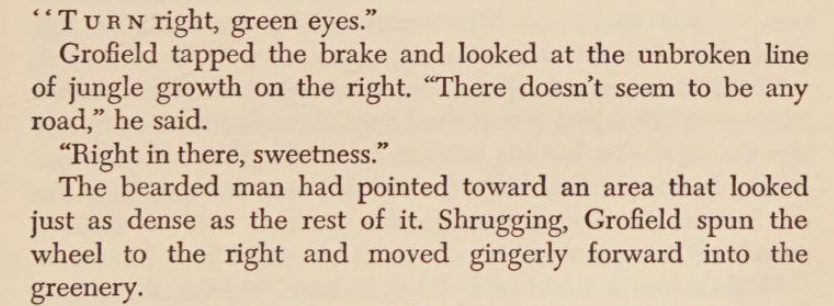
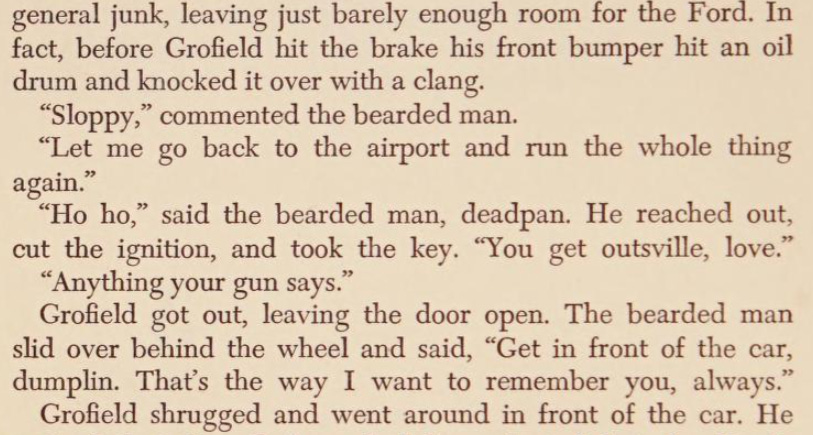
On a closer look, their dialogue is not dissimilar. If Grofield gets called ‘honey’, ‘sweetness’, ‘love’ here, then he himself has in turn referred to other men as such. There’s the instance of ‘dear heart’ above, and in The Handle (1966) alone, he calls Parker a ‘true romantic’, ‘love’, a ‘wonder’.
To take it a step further, Stark drives the point home with a variety of notable details. Grofield’s just about the only character in these novels to ever make mention of his mother (“Mother, in my last moments I was thinking of you”, from The Handle), he’s extremely dedicated to the arts (“The point was, acting wasn’t his living, it was his life”, from Butcher’s Moon), he’s remarkably well-read and immersed in general knowledge – he calls a boatman their ‘Charon’, to Parker’s confusion. In fact, Grofield’s always making literary allusions but none as significant as in The Blackbird (1969), where he quotes Oscar Wilde from memory:

A Wilde quote is striking enough, but a direct reference to his imprisonment for homosexuality is nothing short of remarkable.
Still, Grofield is a character built between contradictions. Were that the extent of his characterisation, Richard Stark could be accused of having made him a stereotype – a layered one, but a stereotype nonetheless. Instead, the Westlakeian irony of Grofield lies in the fact that there is no doubt about his sexuality, yet he’s married and an incurable flirt. To that extent, he’s a rare instance of a bisexual character in crime fiction of that period.
Unlike Parker’s unsatisfying flings, his lack of real interest in women, Grofield’s attraction is genuine but never overly ‘straight’ in manner and approach. He repeatedly calls Elly ‘dear girl’ and ‘dear child’ in The Damsel; with Crystal in The Handle, he’s appreciative of her figure but more concerned with the aesthetic value of the picture she makes sitting in her pajamas rather than any desire for her nude body; he’s as particular as Parker is about his sexual habits but primarily concerned with women’s pleasure over his own. Notably, after a one-night stand in Butcher’s Moon, Grofield needs to recall his past history in order to determine the gender of the person he’s woken up with.

One of the most fascinating pieces of the puzzle comes in the form of Grofield’s marriage. It’s not just the incessant cheating that denotes his unhappiness with Mary Deegan, but the fact that he appears to view their domestic life as a performance. When he first meets her and brings her along, we’re explicitly told, “Grofield had the look on his face that a man gets when he’s done something too stupid to be possible and he knows it but he still wants to justify it” (The Score). Later, having married Mary, Grofield states, “my nosebleeds come from my wife” (The Handle), and tellingly compares her to Hedda Gabler from the 1891 eponymous play by Henrik Ibsen. Subsequently, Mary makes no appearances in any of Grofield’s first three solo novels and when we finally see a supposedly intimate moment at ‘home’ in Lemons Never Lie (1971), one is struck by the sheer artificiality of it:
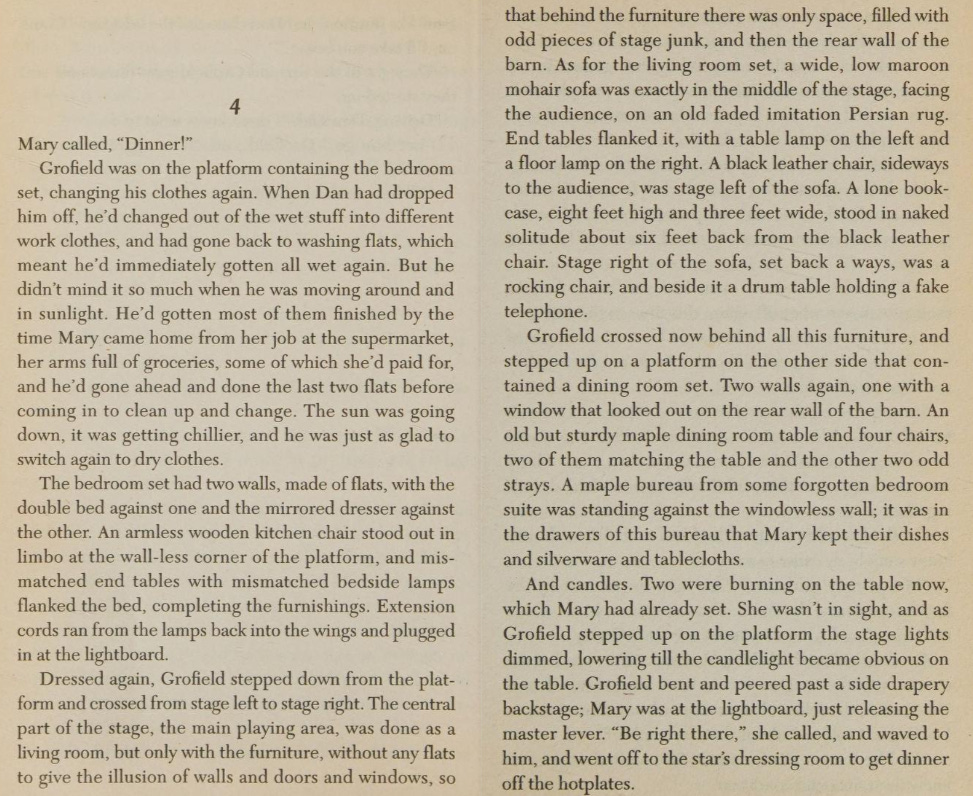

Grofield is playing at heterosexual bliss. For whatever reason, he cannot see his marriage as anything other than an act – he’s on stage, he’s got his ‘place’, his lines, his cues. Earlier in The Dame, in an understated moment of vulnerability, he agrees he’s not ‘husband material’ despite already being married at the time:
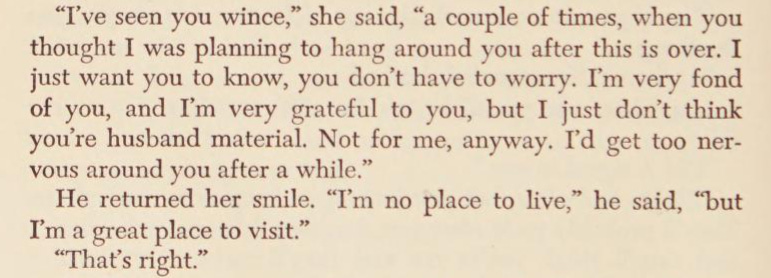
Grofield’s relationship with his sexuality is further complicated by the fact that he’s consistently placed in a feminine role within the narrative. Perhaps one of Stark’s most compelling choices, Grofield is cast as the damsel in distress in two out of three major appearances in the Parker novels, and at least once in his own adventures.
In The Handle, his rescue culminates in a homoerotically-charged scene in a hotel room with Parker, in which Grofield describes himself as being ‘weak as a kitten’. In The Blackbird, Grofield is drugged and kidnapped, only to be saved by the federal agent responsible for his predicament in the first place. Unlike the average straight male protagonist of the crime or espionage genres, Grofield is allowed sincere emotion beyond the strict boundaries of masculinity – he panics, wants to weep, beg for his life, he thinks of kissing his captors when he learns he won’t be killed.

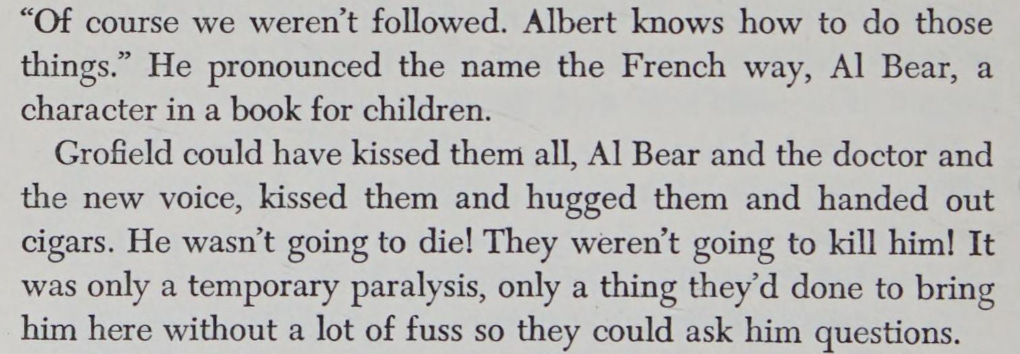
In Butcher’s Moon, Grofield is narratively treated as Parker’s love interest. Had the events of the novel concerned Claire Carroll, there would be no doubt about the nature of Parker’s feelings. In fact, not only is Parker more frantic, vulnerable, affected than he’d ever been in Deadly Edge (1970), Grofield is also in the position of a more traditional romantic interest than Claire had ever been – if she’d kept her agency, then he’s completely incapacitated and dependent on being rescued. More so, Grofield’s kidnapping is textually taken as the only way to hurt Parker.
Ultimately, Grofield constitutes the emotional core of Parker’s character development. Not only does he ever so skillfully warm Richard Stark’s ice-cold antihero, as the protagonist of his solo novels, Alan Grofield makes for one of the most radically unconventional characters to have ever played the lead in mainstream crime fiction.